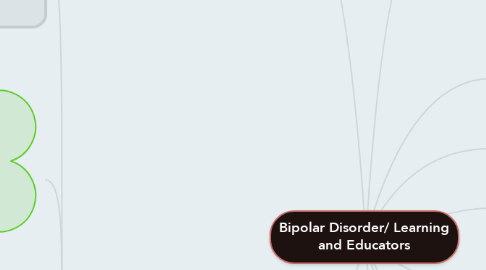Bipolar Disorder/ Learning and Educators
by Kathy Hill


1. How does it effect Learning?
1.1. Neurological
1.1.1. MRI, fMRI
1.1.2. Physical effect on the brain
1.1.2.1. The bipolar brain is different--why?
1.1.2.1.1. Lesions
1.1.2.1.2. Gray Matter
1.1.2.1.3. Cerebullum
1.1.2.1.4. lobes
1.1.3. Journals
1.2. Stigma
1.2.1. Social Reject/ Social "Death"
1.2.2. Not receiving Help
1.2.3. Embarrassing for family and student
1.2.4. Family Secret Disease
1.3. Personality
1.3.1. Inability to feel "normal"
1.3.1.1. Irritability
1.3.1.2. Lashing out
1.4. Cognitive Impairment
1.4.1. Attention
1.4.1.1. Destinations
1.4.2. Working Memory
1.4.2.1. Visual
1.4.2.2. Verbal
1.4.2.3. Repetitive Skills
1.4.3. Verbal Learning
1.4.4. Implicit Motor Learning
1.4.5. Executive Functioning
1.4.5.1. Decision Making
1.4.5.2. Rational Thinking
1.4.5.3. Sound Judgement
1.4.6. Processing Speed
1.5. Sources: Journals
2. Conclusion
3. Legislation
3.1. Sources: The book "A Common Struggle" by Patrick Kennedy. The history of bills on mental health. Journals
4. Introduction
4.1. Why is this improtant to me and education?
5. What is Bipolar Disorder?
5.1. DSM IV description
5.2. Symptoms
6. Prognosis
6.1. Chronic Illness
6.2. Improvement over time?
6.3. Medicinal Practices
7. Genetics
8. Clinical Staging
9. Quality of Life
9.1. Student
9.1.1. Caregivers
